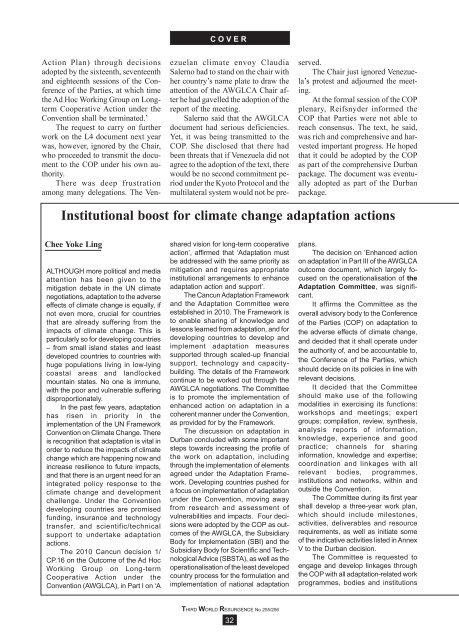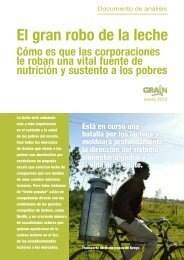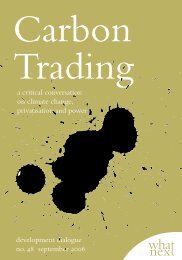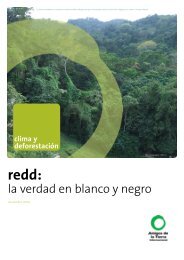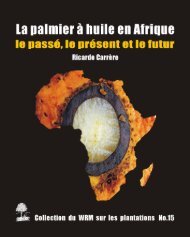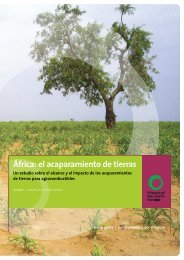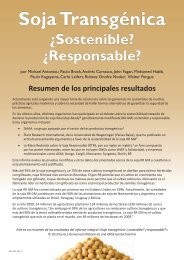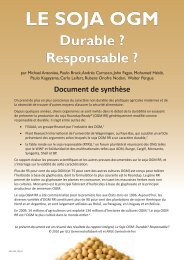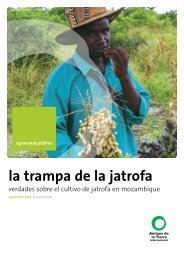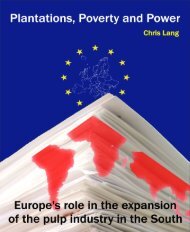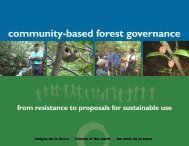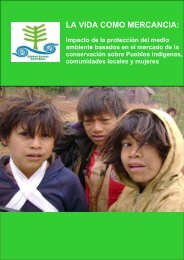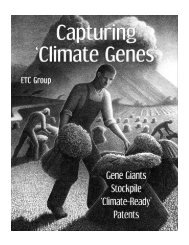Download - Third World Network
Download - Third World Network
Download - Third World Network
Create successful ePaper yourself
Turn your PDF publications into a flip-book with our unique Google optimized e-Paper software.
C O V E RAction Plan) through decisionsadopted by the sixteenth, seventeenthand eighteenth sessions of the Conferenceof the Parties, at which timethe Ad Hoc Working Group on LongtermCooperative Action under theConvention shall be terminated.’The request to carry on furtherwork on the L4 document next yearwas, however, ignored by the Chair,who proceeded to transmit the documentto the COP under his own authority.There was deep frustrationamong many delegations. The Venezuelanclimate envoy ClaudiaSalerno had to stand on the chair withher country’s name plate to draw theattention of the AWGLCA Chair afterhe had gavelled the adoption of thereport of the meeting.Salerno said that the AWGLCAdocument had serious deficiencies.Yet, it was being transmitted to theCOP. She disclosed that there hadbeen threats that if Venezuela did notagree to the adoption of the text, therewould be no second commitment periodunder the Kyoto Protocol and themultilateral system would not be preserved.The Chair just ignored Venezuela’sprotest and adjourned the meeting.At the formal session of the COPplenary, Reifsnyder informed theCOP that Parties were not able toreach consensus. The text, he said,was rich and comprehensive and harvestedimportant progress. He hopedthat it could be adopted by the COPas part of the comprehensive Durbanpackage. The document was eventuallyadopted as part of the Durbanpackage.Institutional boost for climate change adaptation actionsChee Yoke LingALTHOUGH more political and mediaattention has been given to themitigation debate in the UN climatenegotiations, adaptation to the adverseeffects of climate change is equally, ifnot even more, crucial for countriesthat are already suffering from theimpacts of climate change. This isparticularly so for developing countries– from small island states and leastdeveloped countries to countries withhuge populations living in low-lyingcoastal areas and landlockedmountain states. No one is immune,with the poor and vulnerable sufferingdisproportionately.In the past few years, adaptationhas risen in priority in theimplementation of the UN FrameworkConvention on Climate Change. Thereis recognition that adaptation is vital inorder to reduce the impacts of climatechange which are happening now andincrease resilience to future impacts,and that there is an urgent need for anintegrated policy response to theclimate change and developmentchallenge. Under the Conventiondeveloping countries are promisedfunding, insurance and technologytransfer, and scientific/technicalsupport to undertake adaptationactions.The 2010 Cancun decision 1/CP.16 on the Outcome of the Ad HocWorking Group on Long-termCooperative Action under theConvention (AWGLCA), in Part I on ‘Ashared vision for long-term cooperativeaction’, affirmed that ‘Adaptation mustbe addressed with the same priority asmitigation and requires appropriateinstitutional arrangements to enhanceadaptation action and support’.The Cancun Adaptation Frameworkand the Adaptation Committee wereestablished in 2010. The Framework isto enable sharing of knowledge andlessons learned from adaptation, and fordeveloping countries to develop andimplement adaptation measuressupported through scaled-up financialsupport, technology and capacitybuilding.The details of the Frameworkcontinue to be worked out through theAWGLCA negotiations. The Committeeis to promote the implementation ofenhanced action on adaptation in acoherent manner under the Convention,as provided for by the Framework.The discussion on adaptation inDurban concluded with some importantsteps towards increasing the profile ofthe work on adaptation, includingthrough the implementation of elementsagreed under the Adaptation Framework.Developing countries pushed fora focus on implementation of adaptationunder the Convention, moving awayfrom research and assessment ofvulnerabilities and impacts. Four decisionswere adopted by the COP as outcomesof the AWGLCA, the SubsidiaryBody for Implementation (SBI) and theSubsidiary Body for Scientific and TechnologicalAdvice (SBSTA), as well as theoperationalisation of the least developedcountry process for the formulation andimplementation of national adaptationplans.The decision on ‘Enhanced actionon adaptation’ in Part III of the AWGLCAoutcome document, which largely focusedon the operationalisation of theAdaptation Committee, was significant.It affirms the Committee as theoverall advisory body to the Conferenceof the Parties (COP) on adaptation tothe adverse effects of climate change,and decided that it shall operate underthe authority of, and be accountable to,the Conference of the Parties, whichshould decide on its policies in line withrelevant decisions.It decided that the Committeeshould make use of the followingmodalities in exercising its functions:workshops and meetings; expertgroups; compilation, review, synthesis,analysis reports of information,knowledge, experience and goodpractice; channels for sharinginformation, knowledge and expertise;coordination and linkages with allrelevant bodies, programmes,institutions and networks, within andoutside the Convention.The Committee during its first yearshall develop a three-year work plan,which should include milestones,activities, deliverables and resourcerequirements, as well as initiate someof the indicative activities listed in AnnexV to the Durban decision.The Committee is requested toengage and develop linkages throughthe COP with all adaptation-related workprogrammes, bodies and institutionsTHIRD WORLD RESURGENCE No 255/25632


